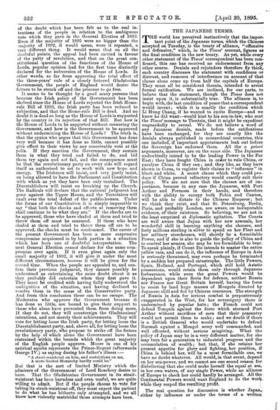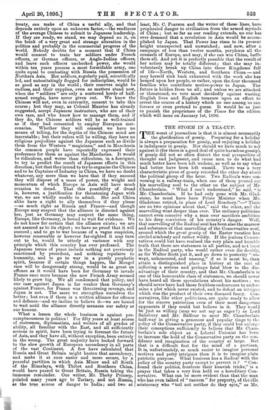THE JAPANESE TERMS. T HE world has perceived instinctively that the
impor- tant point of the Japanese terms, which the Chinese accepted on Tuesday, is the treaty of alliance, "offensive and defensive," which, in the Times' account, figures as the final condition in the new treaty. As yet, while every other statement of the Times' correspondent has been con- firmed, this one has received no endorsement from any other source. Denials and rejoinders therefore fly thick, each country discusses the statement with confidence or distrust, and rumours of interference on account of that clause alone come up from half the capitals of Europe. They must all be considered threats, intended to arrest formal ratification. We are inclined, for our parts, to believe that the statement, though the Times does not insist upon it, is substantially true. The alliance is, to begin with, the last condition of peace that a correspondent would invent; while it is exactly the condition which Li Hung Chang, if he wanted to excite Europe—and we know he did want—would hint to his son-in-law, who sent the Times' message to Tientsin, that it might be expedient unguardedly to reveal. We do not believe a word of any Japanese denials, made before the ratifications have been exchanged, for they are exactly like the denials always published in monarchical countries, this one included, if important appointments leak out before the Sovereign has endorsed them. All the a priori arguments, moreover, are on the same side. The Japanese undoubtedly intend to be the leading Power in the Far East ; they have fought China in order to rule China, or paralyse China if they can ; and they like, as they have shown in Corea, to register their claims to " influence " in black and white. A secret clause which they could pro- duce if China proved refractory would exactly suit their policy. We are not sure that the clauses are of im- portance, because in any case the Japanese, with Port Arthur and Formosa in their hands, and therefore with the ability to occupy both Pekin and Canton, will be able to dictate to the Chinese Emperor; but we think they exist, and that St. Petersburg, Berlin, Paris, and probably London, are aware, on indisputable evidence, of their existence. So believing, we are not in the least surprised at diplomatic agitation. The Courts are well aware that Japan with her new arsenals, her wonderful skill in learning anything she chooses, and forty millions sterling in silver to spend on her Fleet and her military storehouses, will shortly be a formidable Power, and if she is also to guide the policy of China and to control her armies, she may be too formidable to bear. To speak plainly, if Count Ito intends to master the entire yellow race, and can do it, the influence of Europe in Asia is seriously threatened, may even perhaps be terminated by a sudden but prepared catastrophe. The little Powers, Spain, Holland, and Portugal, which still hold Asiatic possessions, would retain them only through Japanese forbearance, while even the great Powers would be dependent upon their fleets for defence, neither Russia nor France nor Great Britain herself, having the force to resist by land huge masses of Mongols directed by Japanese skill and fed by Chinese resources. The strength of Russia in Asia for serious combat is preposterously exaggerated in the West, for her sovereignty there is undermined by popular hate ; the French could not defend Tonquin against the force which stormed Port Arthur without sacrifices of men that their peasantry would not permit them to make ; and we doubt if there is a British General who would undertake to defend Burmah against a Mongol army well commanded, and well officered, without serious misgiving. What the policy of Japan may be is a very different matter, for she may turn for a generation to industrial progress and the accumulation of wealth ; but that, if she retains her present appetite for glory and fighting, her position, if China is behind her, will be a most formidable one, we have no doubt whatever. All would, in that event, depend on her sea-power, and we cannot see one sound reason for disbelieving that she could make herself the equal at sea, in her own waters, of any single Power, While an alliance of Europe to check her could hardly be arranged. All the Continental Powers would want England to do the work. while they reaped the resulting profit.
The real question for discussion is whether Japan,. either by influence or under the terms of a written treaty, can make of China a useful ally, and that depends entirely upon an unknown factor,—the readiness of the average Chinese to submit to Japanese leadership. If they are ready, we stand, we may depend on it, on the brink of a very great and strange alteration in the politics and probably in the commercial progress of the world. Nobody doubts for a moment that if China would consent to train her soldiers under French officers, or German officers, or Anglo-Indian officers, and leave such officers unchecked power, she would within ten years possess a most formidable army, one quite equal to contesting with Russia the possession of Northern Asia. Her soldiers, regularly paid, scientifically led, and unhesitatingly flogged for indiscipline, would be as good as any in the world ; their reserves might be endless, and their supplies, even as matters stand now, when the " soldiers " are only a scattered horde of half- armed roughs, have never given out. We know the Chinese will not, even in extremity, consent to take this course ; but they may, as Colonel Maurice has already suggested, accept Japanese instructors, who are of their own race, and who know how to manage them, and if they do, the Chinese soldiers will be as well-trained as if they had consented to employ European mer- cenaries. Whether they will consent we have no means of telling, for the depths of the Chinese mind are inscrutable ; but their rulers will be willing, they have no religious prejudices against the Japanese such as divide them from the Western " magicians," and in Manchuria the common people have repeatedly expressed their preference for them as against the Mandarins. It would be ridiculous,, and worse than ridiculous, in a foreigner, to try to predict the result of Japanese efforts in this direction; but that they intend to try to organise the Chinese and to be Captains of Industry in China, we have no doubt whatever, any more than we have that if they succeed they will dispose of a mass of power, the weight and momentum of which Europe in Asia will have much occasion to dread. That this possibility of dread is, however, a justification for threatening Japan with war, we are wholly unable to admit. She and China alike have a right to ally themselves if they please —as much right as Russia and France—and though Europe may suspect that the alliance is directed against her, just as Germany may suspect the same thing, Europe, like Germany, is bound to wait for evidence. We do not know for certain that the alliance exists • we are not assured as to its object ; we have no proof that it will succeed ; and to go to war because of a vague suspicion, however reasonable or however far-sighted it may turn out to be, would be utterly at variance with any principle which this country has ever professed. The Japanese terms of peace include nothing not previously sanctioned by precedent, and nothing repulsive to humanity, and to go to war in a purely prophetic spirit, because if certain things happen, the Mongol race will be dangerously strong, would be as great an offence as it would have been for Germany to invade France once more because the new French Army seemed likely to grow big. We all condemned that policy, and our case against Japan is far weaker than Germany's against France, for France was threatening revenge, and Japan is not. The more we strengthen ourselves the better • but even if there is a written alliance for offence and defence—and we incline to believe it—we are bound to wait until the alliance directly menaces our safety or our honour.
What a lesson the whole business is against pre- sumptuousness in politics ! For fifty years at least scores of statesmen, diplomatists, and writers of all grades of ability, all familiar with the East, and all sufficiently serious in spirit, have been trying to forecast the future of Asia, and they have all, without exception, been entirely in the wrong. The great majority have looked forward to the slow growth of European ascendency in all parts of the vast Continent. A few have calculated that Russia and Great Britain might hasten that ascendency, and make it at once easier and more secure, by a peaceful partition in which Asia Minor and all South of the Himalaya, with Thibet and Southern China, would have passed to Great Britain, Russia taking the immense remainder. One writer, Mr. Thoby Prinsep, pointed many years ago to Tartary, and not Russia, as the true source of danger to India; and two at least, Mr. C. Pearson and the writer of these lines, have prophesied danger to civilisation from the armed myriads of China ; but so far as our reading extends, no one has ever dreamed that a revolution in Asia would be accom- plished by Japan. That Power has risen to its present height unsuspected and unwatched ; and now, after a campaign of less than twelve months, perplexes all the counsels of Europe, and may, if she can win China, baffle them all. And yet it is perfectly possible that the result of her action may be totally different ; that she may in- voluntarily break up China into three Kingdoms full of life—North, Western, and Southern China — and may herself sink back exhausted with the work she has heaped upon her people, or rather, upon the four thousand families who contribute motive-power to Japan. The future is hidden from us all ; and unless we are attacked or threatened, we vote most decidedly against wasting English lives and English treasure upon an effort to arrest the course of a history which no one among us can foresee or even pretend to guess. It would be as just to punish the proprietors of the Times for the edition which will issue on January 1st, 1896.



































 Previous page
Previous page